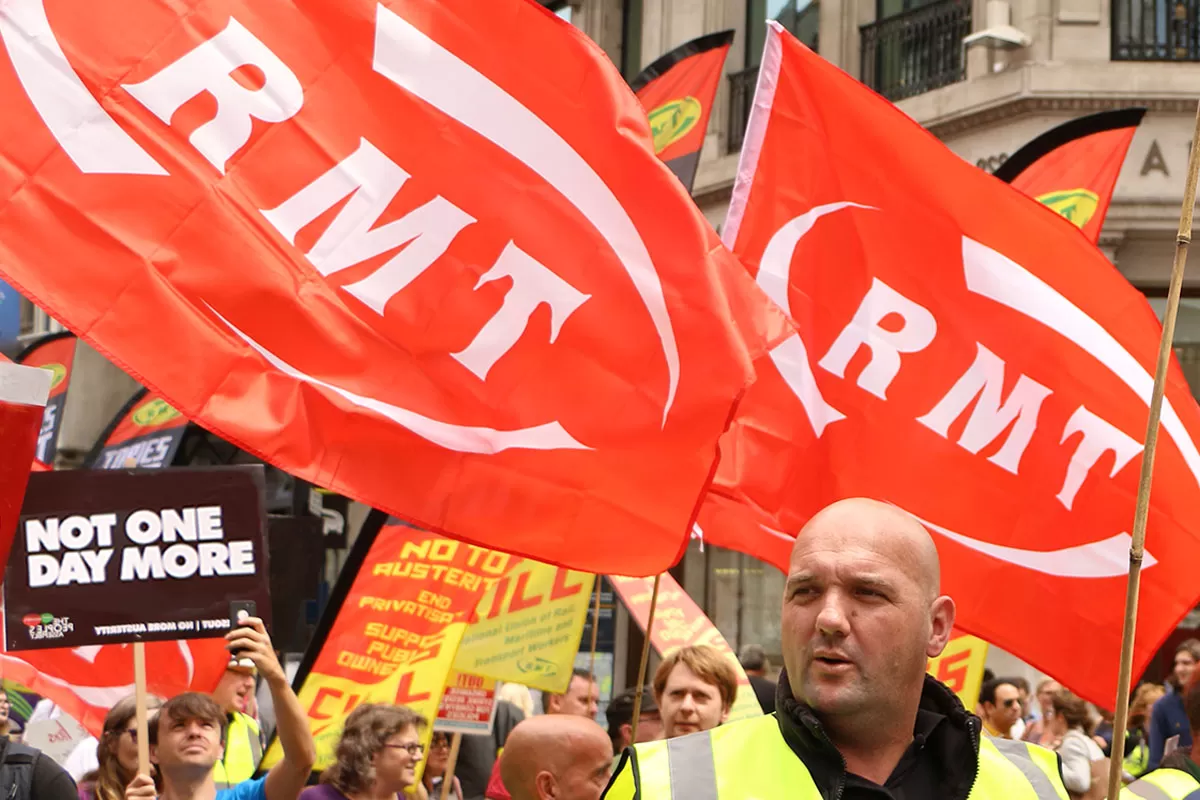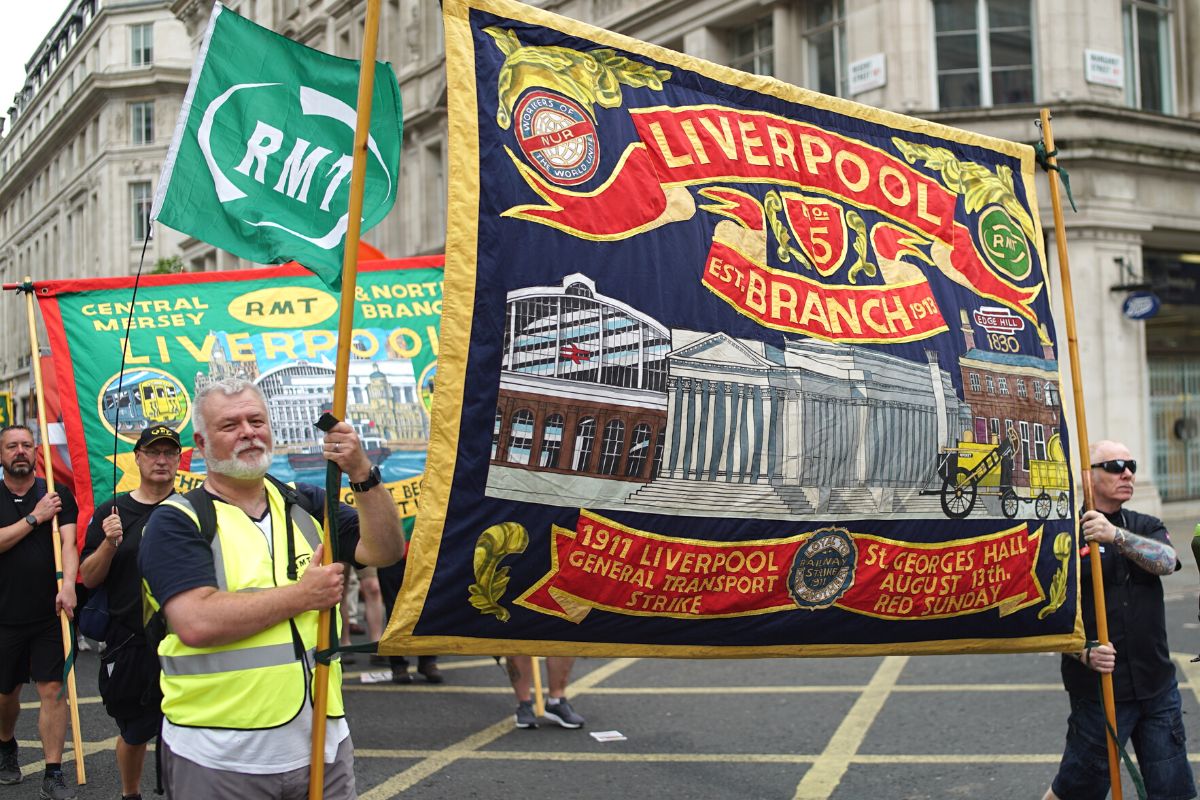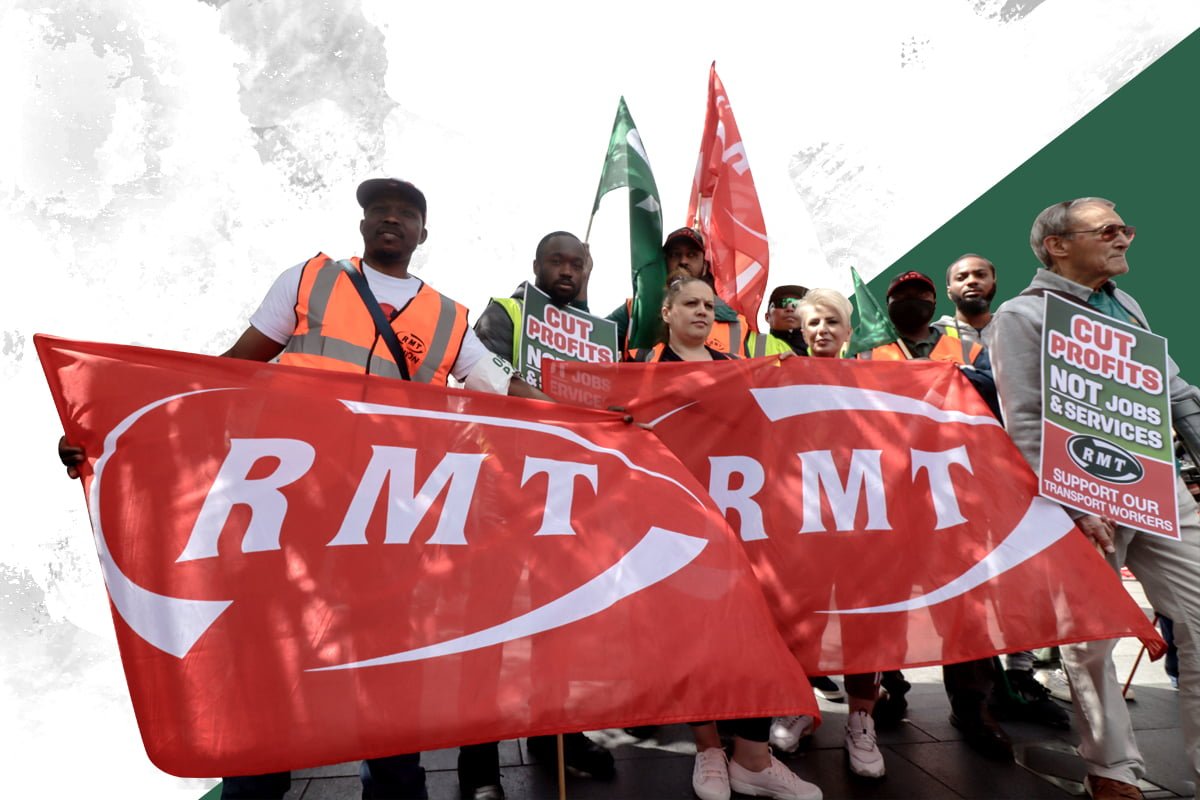Further rounds of strikes have been called by the RMT and other rail unions. The mood is there for coordinated action – across the railway sector and beyond. The trade union leaders must organise a mass campaign to bring down the Tories.
The Rail, Maritime and Transport Union (RMT) has announced the next days of strike action in its national dispute over jobs, pay, conditions, and pensions. These are set for 27 July, 18 August, and 20 August.
This second wave of action follows on from three strike days in June. These saw strong mobilisation on the picket lines, mass support from other sectors, and coordination with Transport for London workers and train drivers organised in ASLEF.
Rail workers at the GTR franchise – which includes Southern and Thameslink services – will also join the next walkout. This means RMT members at a total of 14 train operating companies (TOCs) will now be striking together, alongside members at infrastructure controller Network Rail.
The RMT recently won pay deals of over 8% at London Overground and Eurostar, and over 7% on the DLR and Merseyrail. This proves that militancy pays.
So far, however, the TOCs involved in the national dispute have yet to make any serious offer. And Network Rail remains steadfast on its programme of cuts.
Slap in the face

According to Network Rail bosses, a “fair and affordable” wage increase can only be granted only if “modern working practices” are embraced. The “fair and affordable” increase they have offered rail workers would comprise only 4% for this year, against an RPI inflation rate of over 11%.
Concretely, this means that, in exchange for a real-terms pay cut for most, one third of workers will lose their jobs, half of maintenance will be slashed, workloads will be increased, and safety will be thrown down the drain.
These so-called ‘modern’ practices would in fact throw us back to the dark days of rail infrastructure privatisation in the 1990s, whilst paving the way for Dickensian-style working conditions.
No wonder RMT leaders have rejected this insulting offer, which senior assistant general secretary Eddie Dempsey rightly called “a slap in the face to our members”.
We must state the truth. The bosses are not interested in negotiating any genuine offers. As RMT general secretary Mick Lynch stated recently at the Tolpuddle Martyrs Festival, this dispute “is not all about money…What they want to do is take everything off us”.
The proposed cuts would put the lives of rail workers and passengers at risk, while ensuring the further decay of Britain’s railways, which already lag decades behind most other advanced capitalist countries.
These attacks must therefore be resisted with the most militant industrial action possible.
Coordinated action
Other rail unions are also moving into action. ASLEF train drivers, for example, have won a resounding national ballot, and will be coordinating strike action across eight TOCs on 30 July – the first mass drivers’ walkout in 27 years.
At the same time, more than 6,000 Network Rail workers organised in the TSSA – in engineering, maintenance, control and other key roles – recently won their ballot for strike action.
The mood is clearly present amongst rank-and-file union members for a united fightback against the pay cuts and degrading conditions that railway workers face.
But this trend is not isolated to the rail industry. Across the trade union movement, workers are facing the same attacks, and have been inspired by the RMT’s mobilisation to take action themselves.
The CWU is currently undertaking a national ballot amongst members in the postal service. Civil servants in PCS and teachers in the NEU are preparing their own strike ballots. And even doctors and barristers are on the move.
On every RMT picket line last month, the watchword was for coordinated action across these sectors, including a one-day public sector strike.
It is therefore imperative that rank-and-file members link up across the trade union movement – both in the rail sector and other industries; both through the TUC and outside of these official channels, in workplaces, communities, and trades councils – to turn this mood for united action into a reality.
Crucially, the momentum for mass coordinated action must be maintained by escalating and broadening these struggles between each strike wave, in order to breathe confidence through the wider labour movement.
We cannot afford to let our movement fizzle out into a protracted campaign of isolated strike days, as many other struggles unfortunately have in recent years.
Parasites and hypocrites

The Tories have, in the words of Mick Lynch, “shackled” the rail bosses into forcing through the cuts and attacks on rail workers.
But with turmoil at the top of the Tory Party, and the government virtually paralysed by this infighting, the labour movement has been presented with a golden opportunity to land a knockout blow. Now is the time to unite and strike against years and decades of falling wages and austerity politics.
In doing so, the rail unions and the wider movement must mark a decisive break.
In recent interviews, Eddie Dempsey has correctly placed the blame for the cost-of-living crisis on profiteering bosses, who are “having a disco while everyone else is being asked to carry the can and tighten their belts”.
“There is plenty of money in my industry,” the RMT assistant general secretary has stated, “and it is going out of it in the form of profits, and it is leaving this country and going to tax havens.”
The ruthless rail bosses, parasitic shareholders, and degenerate Tories are not the ones putting their lives on the line, making the wheels turn, and working through the night. Yet they have the audacity to impose cuts on our pay, jobs, and conditions, all while seeing their profits soar.
Transport secretary Grant Shapps even contemptuously remarked – after refusing to meet for negotiations with the union – that “no deal was ever going to be good enough for the RMT”.
We reply: no amount of attacks on working and living conditions will ever be good enough for the bosses in a system based on profit!
We have no trust in this band of hypocrites, who spit in our faces, whilst endlessly and vacuously promising talks, partnership, and safe and decent conditions.
It is time for workers themselves to run the shop.
Workers’ power
To see a real change on Britain’s railways, the whole of the labour movement must fight for nationalisation of the sector under democratic workers’ control, as part of a socialist economic plan. Only then will we see the investment that our transport system desperately needs.
Faced with a crumbling government, the time is ripe to escalate and coordinate mass industrial action across the trade union movement: to bring down the Tories, expropriate the profiteers, and put the working class in power.






